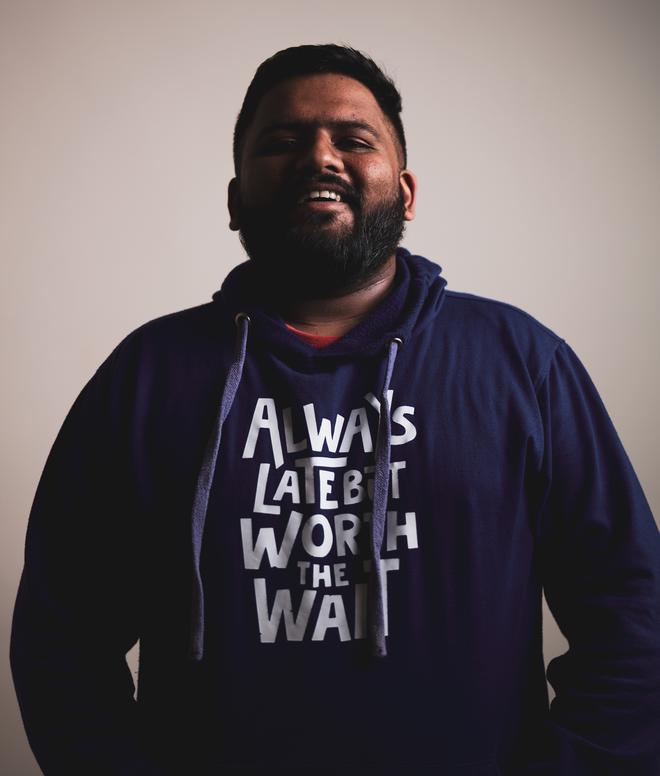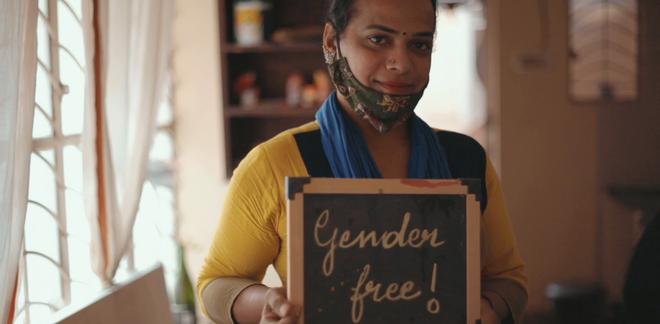When mural artist Shanthi Muniswamy was handed a digital camera, the one image she really wanted to capture was that of a bougainvillea, resplendent in the sunrise. For a ‘90s child like her, the flower held the charm, innocence and nostalgia of a bygone Bengaluru.
“I live in Marathahalli and go for a walk every morning on the bridge, which boasts of a gorgeous bougainvillea plant. But right behind it, you can see a skyscraper which is a recent addition and anachronistic to the 90s. So, I woke up at 5 am and waited for the right light to shoot the photo, with a tight focus on the flower and the skyscraper silhouetted in the background,” says Shanthi.
The journey to many such photographs shot by Shanthi and other transgender artists of the Aravani Art Project finds a place in Kathegala Kanive (Valley of Stories), a documentary directed by Vikas Badiger. The 30-minute film is making its international premiere this month at the Indian Film Festival of Melbourne. Previously, it had bagged the best documentary award at the Madras Independent Film festival.
A collaborative project
The Aravani Art Project, a transwomen and cis-women led art collective, was founded by Poornima Sukumar to address the discrimination faced by the LGBTQIA+ community and create safe spaces for them through art. As part of their continued attempt to reclaim public spaces, Aravani collaborated with Kanike Studios on a photography project that was funded by a grant from the India Foundation for The Arts.

It is this process that Vikas documents with measured restraint, never letting his camera overshadow the ones in the hands of the women — a very conscious decision, he says.
“I wanted to be as authentic as possible without taking away from the story they want to tell. So even before I switched on the camera, I’d ask which angle they preferred or what they wanted to share that day before shooting,” he says.
This was not the first time the women were interacting with Vikas, though. They knew him from an earlier photo series he had done on them for Faces of Bengaluru, Vikas’ Instagram page that profiles people from the city.
“There is very little non-fiction content in Kannada, and more specifically about Bengaluru. When Poornima called me about documenting this, I thought ‘Why not bring both together?’ Moreover, I had not worked with photographers from the trans community, so a lot of factors aligned,” says Vikas.
Connection despite the city
The theme of the project was to explore the trans community’s connection with Bengaluru. However, the documentary does not romanticise Bengaluru through the lens of Aravani’s transwomen. On the contrary, it only makes the viewer more acutely aware of the city’s ability to “other” its marginalised population.
As the women learn the nitty-gritties of handling a digital camera, a gadget as alien to them as the city once was, we also see them rediscovering those aspects of Bengaluru that has kept them here. What we get are stories of love, unexpected friendships, nostalgia, acceptance, desire and resilience that these transwomen have forged despite the city.
A gaze reversed

The project’s objective was to impart an employable skill to the transwomen who do not have any formal education. However, it also achieved something much more remarkable — it subverted the gaze.
“Generally, people take our photos, ask our life histories and leave. When the camera came into our hands, it not only gave us immense power to turn the lens on others, for a change, but also gave us an opportunity to control our own narratives,” says Shanthi.
She also saw how reclaiming public spaces through art — where they are most vulnerable, fearing attack and humiliation — altered people’s perspectives. “As soon as people saw the camera, their curiosity was aroused. Whether I was clicking a paper delivery boy or a flower vendor, their first question was if I was from the media,” she adds.
Focus on non-fiction content
Through the course of the shoot, Vikas observed what a boost of confidence the camera gave the women. He hopes Kathegala Kanive will spark a conversation. “I want to normalise being respectful, cordial and friendly with them. It is not just enough to have a Pride Month without working towards it all year round. In localities where they stay, these women are treated with respect. But I’m yet to see public spaces that are actually inclusive and welcoming of all transgender people.”
As a filmmaker, Vikas wants people to engage with more non-fiction content and points to his recent work The Spirit Circle , a documentary on ultimate frisbee — the world’s only mixed gender sport — currently streaming on Apple TV.
“There is a huge dearth of quality non-fiction content from India. I’d urge people to watch as well as actively involve themselves in creating non-fiction work centred around South India, especially Bengaluru.”







